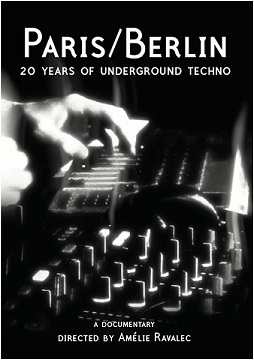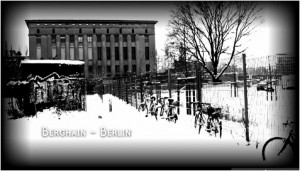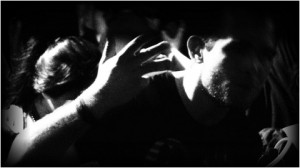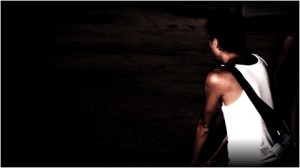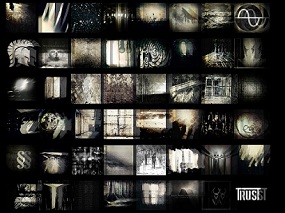Paris / Berlin : 20 Years of Underground Techno _ Interview with Amélie Ravalec
Amélie Ravalec’s new documentary traces the development of the underground techno movement & features those in the scene who kept true to its original spirit. They all have different profiles – dj, producer, label manager, promoter, record shop owner.. but all share a common passion.
We catch up with Amélie to discuss the project, her approach to film-making and of course: Techno.
Congratulations on the film Amélie. How long did it take it to make?
Thanks. Well, I first started doing interviews early 2010, so about two and a half years.
For the moment only a few people have seen it. Mainly the people I interviewed and my friends, as well as people attending the two screenings in Brussels and Athens, but I’ve had some pretty good feedback so far.
How are you distributing it / How much promotion are you doing for it?
I am distributing myself for the moment, though I might get it distributed at some point. I barely did any promotion actually, just posted the trailer on facebook and vimeo.
What was the motivation for making it now? Have you had the concept for a while? It’s refreshing to see a film that is based on uncompromising techno, rather than the commercial interpretation of the genre that we’ve been saturated with over the last decade..
What I had in mind when I started it was to do a documentary about the people that, in my opinion, represented what techno was about.
There had been quite a few great documentaries about the early days of techno, whereas not much had been done on the current scenes. What I wanted, and tried to achieve, was to look up on the evolution of techno over the years till now : how did a movement, which was quite small and unknown at the beginning (like punk when it first started), grew to a point where electronic music, and techno to an extent, is now used everywhere (advertising, etc), and how did a small, “underground” scene, managed to stay alive and interesting aside from that.
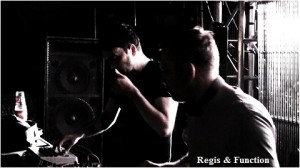
Where did your love of music / Techno come from?
Well, I started going out in clubs and festivals when I was pretty young, and my interest for it grew over the years. One of the first artist and label that really interested me was Terence Fixmer and the Gigolo records label (DJ Hell, etc), which were pretty much the only good techno we had in France.
LINK: Fixmer / McCarthy – Destroy
And what about the visual? When did that interest develop?
I did my first video about three years ago, was just filming a friend after a party, and quite enjoyed it, so few months later I started to film at gigs and interviewed people, in order to do some sort of 5 minutes short movie, and this is pretty much how the documentary started.
How difficult was it to translate your concept to what we see in the film? Was the story that you wanted to tell easy to capture?
To be honest, I didn’t have the whole story, so to speak, at the beginning. It grew over the months and became more obvious, after shooting several interviews and get a more precise idea of what I wanted. I really started to see the whole film when I looked up at all my footage and started the editing.
How long did the editing take? Was it difficult to separate yourself from the process and stick to the original brief, or did you allow the film to take unexpected turns?
It took me nearly six months. I first cut the interviews into some chapters, then slowly began the editing process. I didn’t have a precise brief as I haven’t wrote anything before shooting (which would have actually saved me quite a lot of time).
You have a great line-up of people and places in the film, so balancing all those schedules with general life stuff must have been a challenge at times. People must have been very enthusiastic about the project from the start?
Yes, that’s why the shooting took me nearly two years, I had to go back and forth to Berlin (and some other places) to record interviews, shoot some gigs-footage etc.. People were quite enthusiastic and supportive from the start, which allowed me to interview everyone I was interested in.
How did your home life survive during the process? Were people understanding and supportive, or did they get pissed off at any stage?
It was ok. People at first didn’t believe the film would take such a big amount of time, nor that it would become a “real” documentary (neither did I), but all in all they’d been pretty supportive and helped me out when I needed.
How many hours did you shoot for the film in the end? There must have been lots of interesting bits that didn’t make the final cut.. Anything stand out in particular? What would you have loved to include but couldn’t?
I have about 30 hours of footage. It’s been pretty hard to cut it into one hour, as there were of course quite a lot of interesting things inside. I did an interview with Jean-Yves Le Loup for example, a great french journalist and author, which I unfortunately couldn’t save into the final cut because of some technical issues.
I was listening to an interview with a Hollywood film director the other day and he was talking about how he started off in film. He said it was difficult to try it out due to the cost of camera, film, processing and projectors. The move to digital has obviously made it easier to develop an interest into a career, but how difficult is it to be unique when everyone can shoot film?
Well, that’s a tricky point, and it’s exactly the same for Djing and electronic-music producing. In one hand, it allows people with great talent and ideas to create something they couldn’t have afford otherwise, which is awesome.. but on the other hand, I have the feeling that people don’t value it so much anymore either. It has become quite cheap and easy to do, which leads to an endless production of films that, as well as music, aren’t that interesting.
Being unique is still the same challenge though, great people will stand out and others will be forgotten.
What impact has the likes of You Tube and Vimeo had on film-making? Does it make it easier to get an audience and promote yourself, or is it now simply easier to vanish?
I think You Tube and Vimeo are very different. YouTube is about giving access to everything, Vimeo is a bit more artistic I would say, less stuff but a lot more quality. It’s quite easy to get lost in the mire in both though.
Where do you get your aesthetic from? What are the core principles that you never compromise on?
Well, I guess I just picture visually what I have always liked and what influences me on a day-to-day basis : music, books, ideas, etc..
As long as what I do feels true to myself, then I’m up for everything.. though I would never compromise on aesthetic or my ideas in order to get more credit, money or whatever.
Tell us a little about the Face Down project.
I’m part of Face Down. We’re two, but it’s a kind of collaborative project in a sense that everything and everyone can become part of FD as long as it shares our aesthetic and general ideas. It can be a dj, a film-maker, a painting, whatever really..
And you are involved with Fondation Sonore also..
We created Fondation Sonore last year with a few friends, in order to open a platform for the music we like (and all arts to an extent), which were hardly represented in France and Belgium. We did six events so far, with several artists including Ancient Methods, Adam X, Orphx, Makaton etc, in various locations we liked in Brussels : a train station, a refinery, the garden of an old abandoned administrative offices.. It also became a label recently, which is about to be released very soon, with a first EP by Ancient Methods and Kareem.
Do you DJ / Produce music too?
Well, let’s say I enjoy playing records and playing around with my gear, but I wouldn’t call myself a DJ, nor a music producer yet.
Are there any similarities between distributing music, making a film and putting on shows? Are you a natural hustler?
I think it requires the same things at first: being passionated about what you’re doing, an ability to believe in something which seems impossible to do at first, and a lot of time. Experience teaches you the rest after a while. Doing either independent movies, music, shows and so forth is not something that can exactly brings you tons of money, fame, or whatever it is that motivates people when they enter the business at higher levels. So of course it’s a labour of love and passion.
Where is the line between VJing and Film-making for you? Do you have different approaches or rules with both?
I started film-making first, and playing as a VJ came naturally after some time. It’s all connected of course, and I share the same aesthetic, editing and grading technics, etc, when I shoot my own stuff or when I prepare a vj set with some other people’s material. I approach it pretty much the same as a DJ/Producer would.
You have an incredibly impressive CV.. working with Sandwell District, Stroboscopic Artefacts, Ancient Methods, Makaton, Claudio PRC / Terence Fixmer, to name but a few.. and now your own film. Where’s the next fix coming from for Amélie Ravalec?
I’m doing a video for Tomohiko Sagae’s new ep on Makaton’s label – Rodz Konez. I’ll start working on another film pretty soon, and will also try to focus more on music production, as well as getting our label started. I love doing visuals in every form.. mostly film-making and VJ’ing. For me, it’s the best way to express what I want.
Links :
Pre-order of the DVD now available from http://www.paris-berlin-20years.com/
Also available from Toolbox Records http://www.toolboxrecords.com/fr/product/15483/dvd-selecta/paris-berlin-20-years-dvd/
http://vimeo.com/amelieravalec/videos

